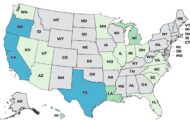The Canadian Public Health Agency has released a statement about the E. coli 0157:H7 outbreak linked to tenderized beef products produced by XL Foods. Beef from that facility has been recalled in massive amounts for the past few weeks. To date, ten cases of E. coli 0157:H7 food poisoning have been linked to the specific strain of the bacteria found during the XL Foods Inc. safety investigation. That is an increase of five cases.
 Three of the newly confirmed case patients live in Alberta, and the other two live in Quebec. Each of the patients became ill more than two weeks ago and have recovered or are recovering, according to the statement. In total, there are seven confirmed illnesses in Alberta, 1 in Newfoundland/Labrador, and two in Quebec. You can find the complete list of recalled products at the CFIA web site.
Three of the newly confirmed case patients live in Alberta, and the other two live in Quebec. Each of the patients became ill more than two weeks ago and have recovered or are recovering, according to the statement. In total, there are seven confirmed illnesses in Alberta, 1 in Newfoundland/Labrador, and two in Quebec. You can find the complete list of recalled products at the CFIA web site.
Symptoms of an E. coli 0157:H7 include severe stomach cramps, diarrhea, which is often watery and may be bloody, vomiting, and a low fever. About 5 to 10 percent of those who contract this infection develop hemolytic uremic syndrome (HUS), a severe complication that can lead to kidney failure and death. Those in high risk groups, including the elderly, the very young, and those with compromised health or immune systems are more likely to develop this complication. About 15% of people in those groups will develop HUS.
Make sure that you check the recall list and stay up to date on which products are recalled. New and expanded recalls are listed almost every day. The recall has expanded from ground beef to include sausages, steaks, roasts, prepared products, and beef jerky. Since foods contaminated with this dangerous bacteria do not look, smell, feel, or taste spoiled, you can’t tell if they contain the bacteria. Always thoroughly cook beef, especially ground beef, which should always reach an internal temperature of at least 160 degrees F (no rare or medium burgers).
If you have eaten beef products and have experienced these symptoms, see your healthcare provider immediately. Long term complications of food poisoning can be severe, and patients often need many follow-up visits.




